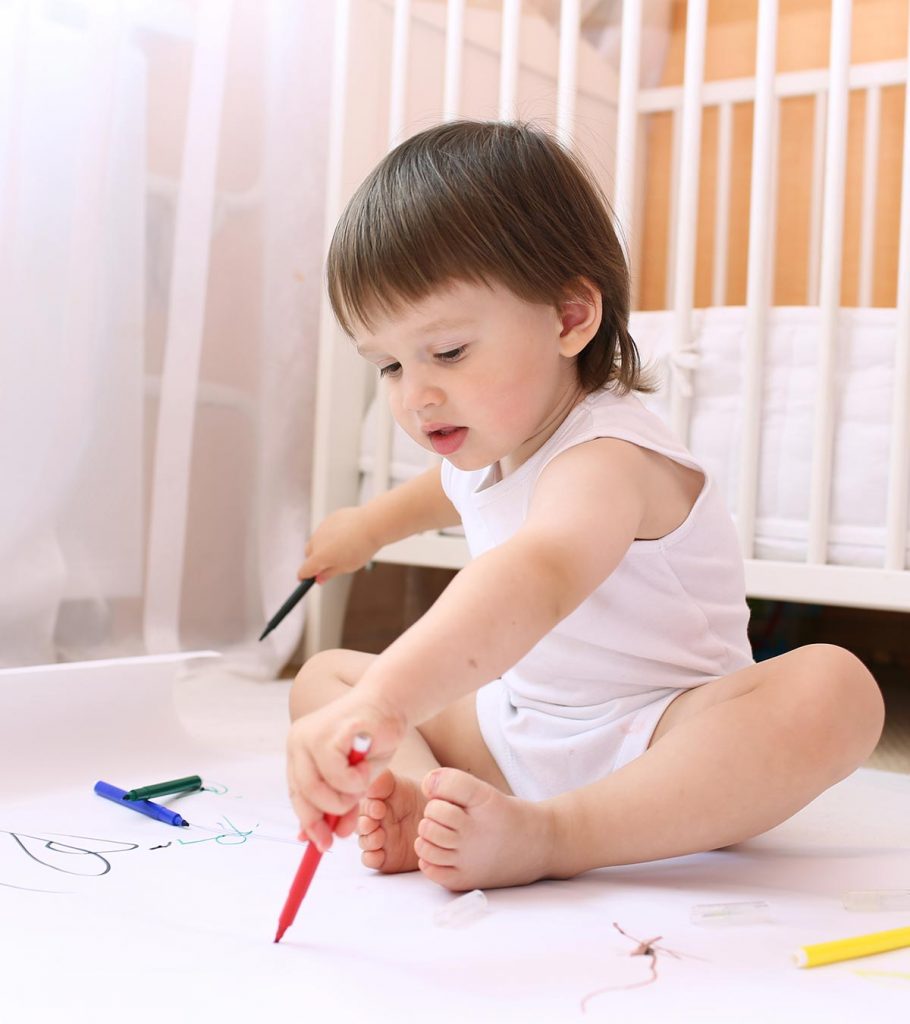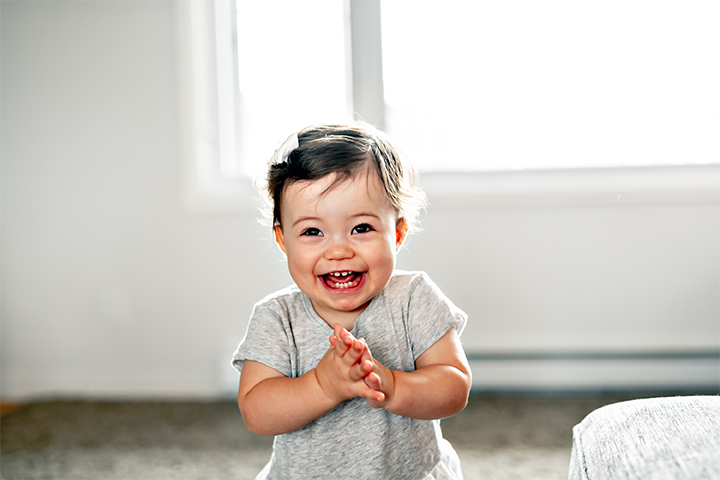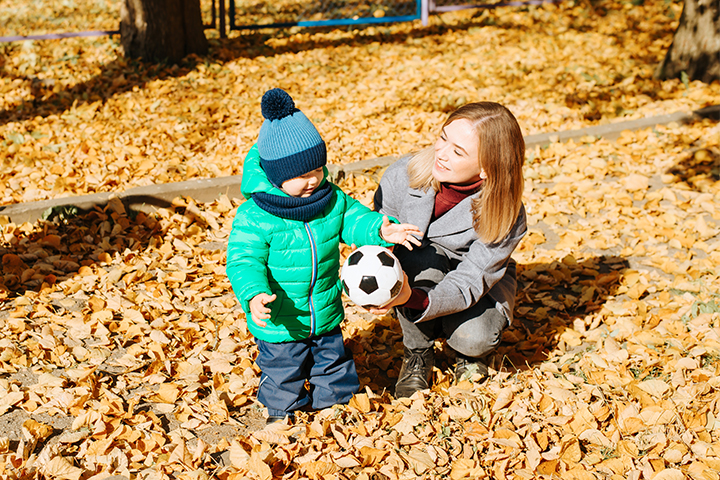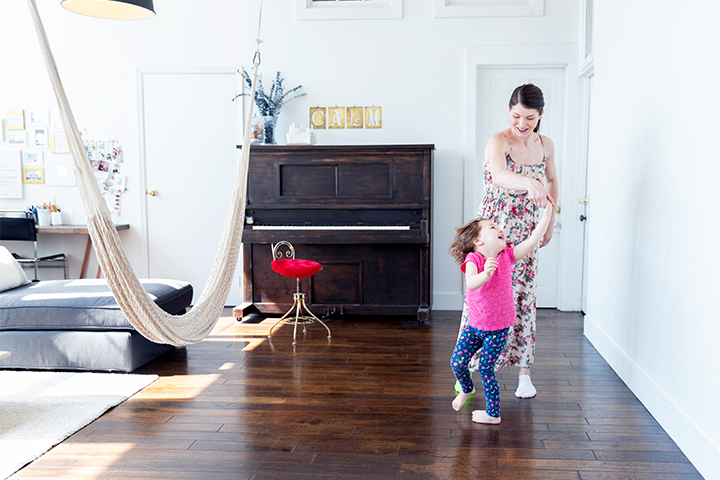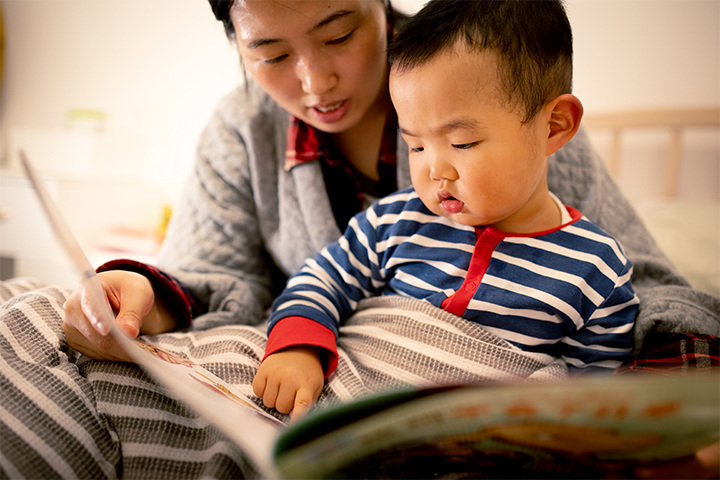During the early months, your baby’s growth may appear quite remarkable (1). Thus, when you observe your 22-month-old developmental milestones, you’ll notice that your baby has learned so much in a short time. By this time, your child may have developed eating preferences and may now throw tantrums.
At 22 months, babies begin to transform into toddlers who are curious to explore their surroundings. This article delves into the developmental milestones – cognitive, physical, social, and emotional – that most children attain at 22 months of age and some helpful advice to help you support their growth and development.
22-Month-Old Development Chart
| Achieved Developmental Milestones | Emerging Developmental Milestones |
|---|---|
| Walks independently | Walks up and down the steps without support |
| Runs in short bursts | Runs longer distance with finer balance |
| Has a set of 16 teeth | Develops the 17th tooth |
| Speaks basic words | Can speak broken sentences mainly heard from parents |
| Can express basic feelings | Can communicate some elaborate thoughts if vocabulary permits |
| Improved finger dexterity | Develops finer range of motion of fingers |
| Enjoys interacting and helping parents | Will oblige for more complex requests by parents |
| Engages in role-play with toys | Can show ability to play more complex games like board games |
| Can kick and throw objects | Will show ability to toss and catch objects |
| Understands rules and restrictions | Can understand complex restrictions with knowledge of adverse outcomes |
22-Month-Old Developmental Milestones
We have categorized the developmental milestones under three categories:
Cognitive Developmental Milestones
Your toddler’s cognitive development is rapid in problem-solving, cause-and-effect, and communication. As a result, they are increasingly curious about the things around them; you may encourage their curiosity by providing ample opportunities for exploration.
These milestones for a 22-month-old pertain to intelligence, rationality, and decision-making capabilities.
- Language and speech development: At 22 months, your toddler can use at least 50 words and imitate new words they hear. They not only understand simple pronouns like “me,” “you,” and “my” but are also able to name familiar objects and pictures in their surroundings. Your toddler can also identify 3-5 body parts when named (2). They will now be able to understand basic words and phrases such as “drink milk”, “smile!” and “what’s your name?”. They will even have a better understanding of some complex instructions like “Go get your toys from bed.” They will babble less, and speak more definitive words. A 22-month-old will also talk to themselves when they are playing alone. They will do so primarily to test their vocabulary and experiment with their voice.
Your little one will acquire the ability to discern between negative and positive words. For example, if they are affirmative about something they will say “yes,” and if they dislike something they may say, “not good.”
- Better memory: They will recognize faces and recollect places. When they see a familiar person they might smile. If you take them to a park where they had fun earlier, they will get excited and clap their hands. This also works with things which they do not like as they will sulk or throw tantrums. According to Dr. Robin Fivush, a researcher at Emory University, in Atlanta, toddlers develop a good sense of memory by the end of the second year of their life. They also develop an understanding of past and present, and may correlate between two events in time.
- Object-noun association: Your 22-month-old will now know what a shoe is, and where its strings are. If you point to an image of a cat in a children’s book, they will recognize it. They will now refer to objects and living beings as a noun. They will also call their sibling or the toddler next door by their name. This also means they will refer to their relatives by the relationship they share with them. When it comes to food, he will be able to differentiate between food items eaten by spoon and those eaten with a fork.
- Understands shapes and orientation: If you give your toddler their favorite book upside down, they will slowly turn the book to its correct position. If you show them how to turn the door knob, they will replicate it. They will remember simple shapes such as a circle, triangle, and square, and will remember the pronunciation of some letters of the alphabet.
- Learns the purpose of objects: Your baby will be a keen observer and will pay attention to the way you use various household objects. They will then try to replicate the action (3). For example, they may pick up a phone and pretend they are talking since they saw their parents do so.
- Find hidden objects: If you hide something from their sight, they will try to unearth the object. They will love playing games that involve hidden objects. This could be games like hide and seek or simple memory-based board games.
- Tests cause and effect:At 22 months, your baby will have a better understanding of cause and effect relationships. This means they will perform an action just to test its probable effect. By the end of two years of their life, a little one understands the cause-effect relationship quite clearly (4).
- Enjoys music and nursery rhymes: They will show an acute interest in nursery rhymes and will recite whatever words they remember. If you sing the first line of the poem, they will attempt to sing the subsequent line. At this age, the toddler will love listening to music and don’t be surprised if they even start to dance.
- Invested concentration: If they love an activity, they will do it until they attain a set goal or achievement. You will no longer have to coax them to sit at one place and play with their toys. They will show finer concentration in the activity, and will not get distracted easily.
Your toddler is also developing their senses by exploring various textures and sounds. They may also gain self-awareness and begin recognizing themselves in the mirror and trying to comprehend their emotions. To support their self-regulation, provide a stable routine, set clear limits, and appreciate them for good behaviors.
The cognitive skills depend on physical development because the baby needs physical strength to reach his intellectual goals.
Physical Developmental Milestones
These are the key improvements you will see in the physical development of your 22-month old.
- Fine-tuned gross motor skills:A 22-month-old will be able to eat from a spoon and drink liquids using a straw. They will be a messy eater but now they have better muscle coordination that will help them put food straight in their mouth rather than spill it around. They will also have ample dexterity to open boxes, cabinets, unscrew caps and stack blocks on top of one another. Your little one will now hold crayons better and scribble and draw some basic shapes. Studies have shown that 22 months is the time when the toddler transitions from scribbling to drawing simple yet meaningful shapes (4).
- More teeth: By the end of the 22nd month, your baby will have a set of 16 teeth, eight each on the upper and lower jaws. They will have the complete set of incisors, canines and one set of molars. This means they can bite and chew food with ease.
- Better body balance: Gone are the days when you will have to hold them every time they reach for a fallen object. They will now bend with ease without plunging forward. What’s more, they will even squat when playing with objects on the floor. They can kick a ball without losing their balance or tripping over the ball. Toddlers of this age will also have a tendency to drag objects along. They will sit on chairs and climb stairs with the support of a rail or by holding the hand of a parent (6).
- Walk independently: Most babies learn to walk alone by 16 months. This means your 22-month-old will require less support and restraint while walking. Their gait will be wobbly, but they definitely have better body balance than before.
- Enjoys running: It is the time when their feet will take flight. By the age of 22 months, a toddler starts experimenting with their ability to move faster with their legs, which means they will love to run a lot (7). Babies in this age group are also known to love riding wheeled toys, such as tricycles and toy cars.
- Sleep schedule for 22-month-old: According to the CDC, children under 12 to 24 months must sleep for at least 11 to 14 hours, including their regular naps (8). On average, children must sleep for 10-12 hours at night. Parents can also provide a one to two-hour nap to provide proper rest during the day. Bedtime routines often begin around 7 pm, with children ready to sleep between 7:30 and 8 pm. Children can wake up anytime between 6 and 7 am, depending on their sleep. Lastly, ensure that the babies are fed at regular intervals so that they can develop a consistent sleep schedule.
Now, when he is talking and walking, he would need people around him to talk and listen.
Social And Emotional Developmental Milestones
Your baby might not be keen to meet or talk to strangers. In fact, they may still cling on to you when they are amidst less-familiar people. However, they will learn to socialize and smile at familiar faces. They will express their emotions. Nurture your toddler’s social skills through social interaction opportunities like playdates or park trips.
- Develops a sense of independence: Do not expect them to wake up on their own, brush their teeth and take a bath. But by 22 months, your little one will show signs of independence (9). They will understand what follows what in their daily routine and look forward to their favorite activity or play time.
Miggi, a 22-month-old toddler, likes to do everything independently. “If I give him a glass of water, he wants to hold it himself and will instantly cry if the glass is in my hand. When I take him to the park, he likes to climb up the slide by himself, although I think it’s a little dangerous. If I try to help him by giving him a little support, he starts crying,” says his mother and the creator behind the YouTube parenting channel Parenting Faridi Cuties (i).
- Improved social and peer play: The toddler develops better relations with other children especially those he has been seeing frequently, such as siblings and cousins. You will notice that he segregates his peers on the basis of his level of rapport. This means, in a group, he will show preference towards the ones he knows rather than the new faces (9). He also begins to show a sense of empathy. For example, if a child hurts himself, your baby might attend to the wound. You will also see a subtle display of diplomacy in certain situations. At the same time, he may feel shy when you introduce him to strangers.
- Imitates adults, understands non-verbal communication: A 22-month-old will imitate adults, predominantly parents, by speaking phrases and words that he has heard from his mother or father. It is quite likely for him to pick up the tone of his parents. He reacts to situations in a manner similar to what the parents once did. This is called Social Referencing and can be seen as early as the 12th month of the baby’s life (8). Your little one will develop a more definitive understanding of non-verbal communication. The next time you put the finger on your lips, he will instantaneously understand that you are asking him to be quiet.
- Understands restrictions: Your 22-month-old behavior will be different – he will begin to discern between reasonable and unreasonable behavior. He will understand and remember the restrictions. For example, he will remember that he is not allowed to step out of the house alone or enter the storeroom without your permission. Since his language skills are better, it will be easier now to introduce new rules.
- Can show preference towards one hand: You can’t really tell if he is left-handed or right-handed till he joins school. But during playtime you may notice he prefers one hand over the other.
- Throws tantrums and shows defiance: This is the age when your baby throws tantrums for the silliest reasons in the world. It usually happens when he does not receive a predictable reaction to his regular action. For example, you always bought him a toy whenever you went to the supermarket. But one day you overlook his demand and refuse to buy him. Your baby will start throwing tantrums and show defiance towards your instructions. He will continue to do so until he realizes that his demands will be dealt with more sternly, and it is going to be the new norm. This is called Instrumental Conditioning, and it is how toddlers learn new rules (11).
- Develops a personality: Your little one will now refer to himself by his name, and will have his own set of characteristics. For the first time you will notice him repeating certain tasks or doing an activity in exactly the same way he did it yesterday and the day before. In other words, he shows the formation of habits – his very own traits.
10 Tips To Improve The Development Of Your 22-Month-Old
Here are some tips that can help you nurture the development of your toddler.
- Your toddler’s attention span has improved but is not fully developed. Therefore, do not push things too far to the point that he feels overwhelmed and exhausted. For example, he may love memorizing nursery rhymes, but if you read a rhyme too fast he will lose interest and never make an effort to learn it.
- Whenever you give him an object, refer it by its name. Studies have shown that labeling objects helps stimulate his language skills (12).
- The conversation that you have during play time can make a key difference in his ability to grasp the language (11). Thus make it a point to talk with your little one while playing instead of leaving him alone with his toys.
- A 22-month-old’s vocabulary increases at a fast pace. He can add five new words to his vocabulary every day (12). Therefore, teach him new words regularly since it can play a key role in deciding how many words your toddler can say.
- Obtain games and toys that will stimulate him visually and mentally.
- Take him to play outside as often as possible, so that he can let loose his desire to run and experiment with his muscle-brain coordination.
- When he throws tantrums, ask him to articulate his demands in words. Motivate him to express his objections rather than simply cry over the matter. Teach him to use polite words like “Please” and “Thank you”.
- Encourage your 22-month-old to go beyond his comfort zone, and interact with other toddlers during play time. This will help him understand the importance of having rich social bonds.
- Babies learn from parents and thus it is important to teach them the correct way to do an activity. For example, if he struggles to throw a ball, show him how to do it. Once he gets it correct, encourage him.
- Remember to baby-proof your home. Your baby is going to be his inquisitive best at this age and will fiddle around with household objects to understand their purpose. Keep hazardous items beyond his reach. For example, pad sharp edges in your home to prevent accidental injuries. Additionally, ensure that small objects that could be choking hazards are also kept out of your baby’s reach during this exploratory phase of development.
If you notice your 22-month-old’s growth, you will realize that they developed quite a lot in a short period. They have become more skilled, independent, and curious. Your baby will now have better speech, memory, and concentration. They will enjoy music and have better body balance. You will also find that your baby is more social than before and will love to interact with peers. If you wish to enhance their development, play games, introduce them to different toys, and take them outdoors, this would be the right time to do so. While supporting and encouraging them, remember that all children have unique skills and achieve milestones at their own pace. However, be vigilant and if you find that your baby is not reaching the milestones even after they are way beyond the right age, discuss it with your doctor.
Key Pointers
- At 22 months, speech and language development is a crucial milestone, with the child able to understand and speak simple words and phrases.
- Improved gross motor skills, such as body balance, walking independently, and a desire to run and play with wheeled toys, develop at this stage.
- Social and emotional milestones include enhanced social and peer play, imitating adults, grasp of nonverbal communication, and knowledge of restrictions.
- Encourage physical and mental growth by providing educational toys and promoting outdoor play.
Watch this interesting and informative video to learn about the exciting development milestones your 22-month-old baby is reaching! See how they’re growing and developing.
